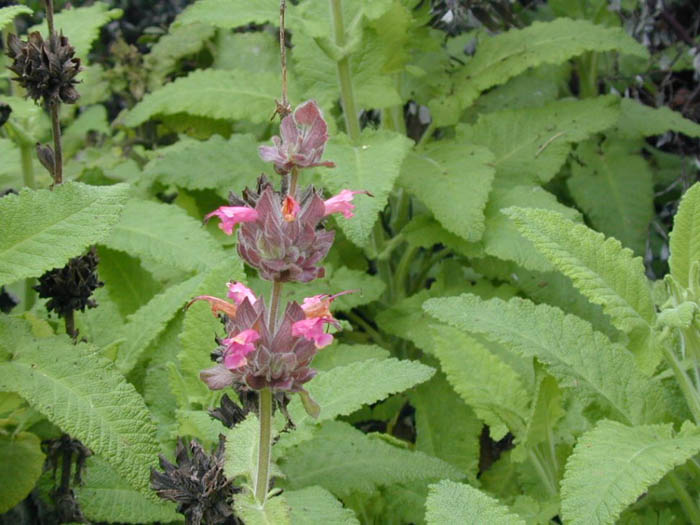
Salvia spathacea
Hummingbird Sage, Pitcher Sage

Description
The extravagant leaves of this small clumping sage emit a perfectly sweet fragrance, which attracts hummingbirds. In the spring, the reddish pink flowering spikes become a deep fuchsia. It is a great plant for dry shade.
Maintenance Tips
Salvia spathacea is a low-growing, perennial sage that is native to coastal regions of California and Oregon. It is commonly called Hummingbird Sage, which is appropriate considering how often they frequent the blooms of this plant. The foliage only reaches 6-8" tall, but the flower spikes can stand up to 2' tall. This plant isn't quite as drought tolerant as many of the other native sages are, so it is best planted in areas where moisture can collect or where there is regular irrigation. It can take full sun coastally, but it prefers some dappled shade inland where the temperatures can get much higher. This is a low-maintenance perennial, but it can take a break in colder winters, often dying back completely. The old foliage and spent blooms can be removed to keep the plant tidy and to encourage new growth.
Plant Type
Shrub
Height Range
1-3'
Flower Color
Pink
Flower Season
Spring, Summer
Leaf Color
Green
Bark Color
n/a
Fruit Color
n/a
Fruit Season
n/a
Sun
Full, Half, Shade
Water
Low
Growth Rate
Moderate
Soil Type
Sandy, Loam, Rocky
Soil Condition
Average, Poor, Well-drained
Soil pH
Neutral
Adverse Factors
n/a
Design Styles
English Cottage, Mediterranean, Ranch, Seascape, Spanish, Wild Garden, Woodland
Accenting Features
Fragrance, Showy Flowers
Seasonal Interest
Spring
Location Uses
Entry, Perennial Border, Foundation, Parking Strip, Patio, Raised Planter, Walkways, With Rocks
Special Uses
Container, Cut Flowers, Filler, Mass Planting
Attracts Wildlife
Hummingbirds
Water Saving Tip:
Water between sunset and sunrise when temperatures and wind are the lowest.